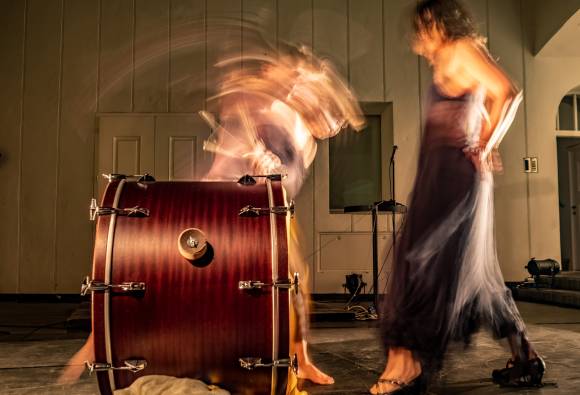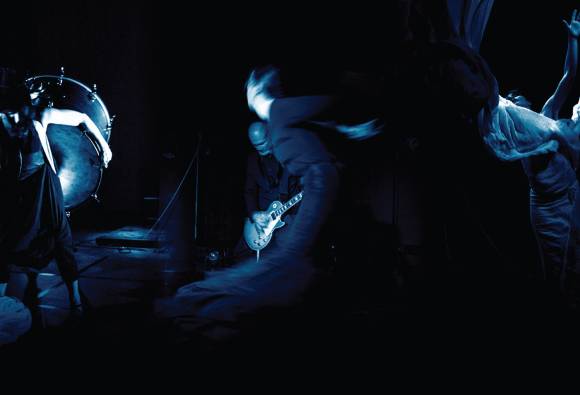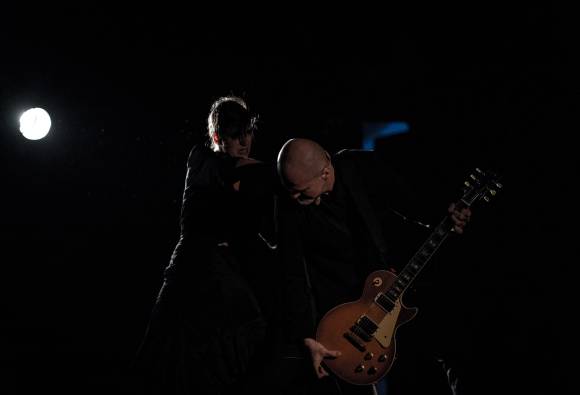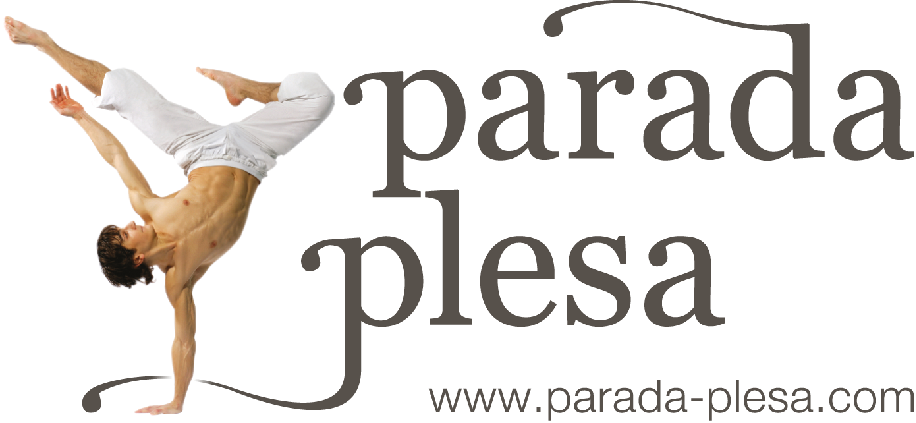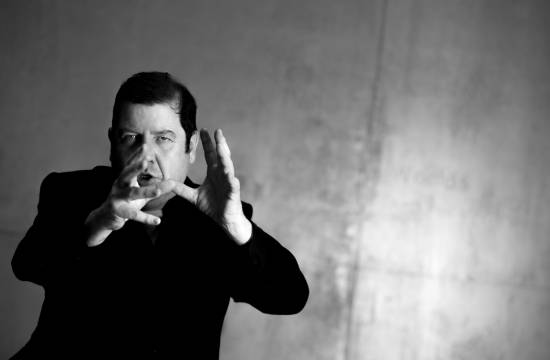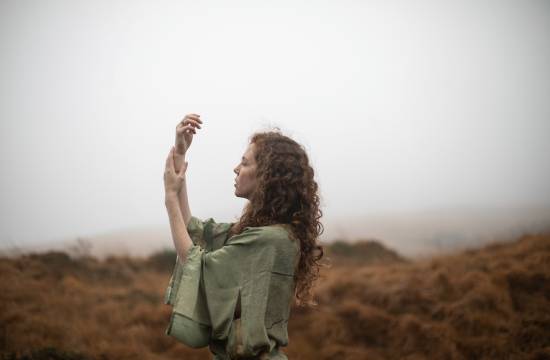Conductor: Ivor Bolton

Ana Pandur: Tris - Triad
Špela Mastnak, Damir Avdić, Matej Bonin: Marija brez glasu, Črni zvoki, Beli šum (Voiceless Mary, Black Sounds, White Noise)
triad, a set or group of three
A hundred minutes for existence.
The 100-minute dance-music show TRIS (TRIAD), modifying and synthetising three independent dance-music projects developed over the last four years, constructs a cohesive unit of architecture. Bringing together three very dissimilar, exceptional music artists, Ana Pandur’s Tris offers a reflection on ways of being.
The path traversed by TRIS ranges from the emergence of an intangible third entity at the intersection of the idioms of music and dance, through the quest for the freedom of flight, on the assumption of an ideological shift of a creative mind, culminating in the establishment of one's own playing field of silence, whiteness, solitude and the body incorporated therein.
Marija brez glasu Voiceless Mary, a duo with percussionist Špela Mastnak and featuring music by Matej Bonin, is a slip, an intangible third entity that emerges at the intersection of two languages, on the borderline between projection and reality. The starting point is always the individual experience of a dancer and musician, whose narrative relates solely to the familiar, interlaced with the question of where in the process is the dimension of the universal, the common human, the connective, which flows comfortingly back into the particular. The female (dancing) body remains a permanent fixture, walking the line between communicating with the self and the externality, while remaining a field of projections, doubts, as well as the search for one's own space, at once a subject and an object.
Črni zvoki Black Sounds, a duo with Damir Avdić and his music, provides a starting point for reflection on the meaning and power of creativity, while raising questions about the ideological abuse of the transformative power of art. With Black Sounds we explore the field of freedom, the break with convention, the intersection of the moment of the personal and the real in a creative act and their implications in the social. Lorca's text, as inspiration and ideological foundation, lends substance to the overriding theme, which is in paradoxical relation to the distortion of meaning that the text has been subjected to in the 20th century, with an emphasis on historical repetition. Articulating a trans-genre freedom, the quest for meaning and the beauty within, or in spite of, a given context, is crucial. Black Sounds thematises the eternal recurrence of the same and the longing for the freedom of flight. Every system that resembles a game also entails a possibility of error, of slipping. At the same time, a slip can result in an ideological distortion that turns a newly created game, bereft of a final thought, into a tool of manipulation whilst also manipulating it. The scales can tip one way or the other. Searching for the intersection of two worlds where the imminence of the end/death is always a foregone conclusion, whether for production, ideological or political reasons, it examines the various consequences of the ideological abuse of creative thought.
Beli šum White Noise, a dance solo featuring music by Matej Bonin as the negative, leads to the creation of its own playing field. The solo is defined by silence, whiteness, solitude and the body incorporated therein. What are the rules of the game in a given situation, what is allowed, where are the limits and what defines them. Creating one's own space when all that is left is solitude. Who sees whom and how the limits of one's world affect the limits of one's freedom. The dance-music project White Noise addresses the themes of loneliness, isolation, punishment and the symbolic exclusion resulting from non-conformity with the current social paradigm and its implications.
Ana Pandur, je avtorica, koreografinja, plesalka, hispanistka in filozofinja je že v času študija na FF v Ljubljani kot izhodišče svojega umetniškega ustvarjanja in preučevanja privzela flamenko in njegovo aplikacijo v sodobne uprizoritvene prakse. Po izobraževanju iz klasičnega baleta je med letoma 2002 in 2004 študirala flamenko ples in teorijo na akademiji Amor de Dios v Madridu. Po povratku v Slovenijo je ustanovila PKD Flamenko, ki ga vodi še danes in iz katerega izhajajo najvidnejša imena sodobne flamenko panorame v našem prostoru. Zadnjih dvajset let deluje kot plesalka, koreografinja in plesna pedagoginja, povezuje flamenko s sodobnimi uprizoritvenimi praksami, s sodobnim plesom in gledališčem. Na Akademiji za ples v Univeze Alma Mater Europaea predava kot nosilka predmeta Medkulturne plesne prakse. Je avtorica številnih plesnih predstav, s poudarkom na interdisciplinarnem ustvarjanju, v katerem vzpostavlja svojstven avtorski, koreografski in uprizoritveni jezik, povezan s flamenkom. Kot koreografinja, plesalka ali performerka sodeluje s številnimi glasbeniki, režiserji in koreografi doma in v tujini, obenem pa se intenzivno posveča oblikovanju giba za gledališče in ustvarjanju lastnih projektov.
Matej Bonin, rojen leta 1986 v Kopru, je diplomiral iz kompozicije pod mentorstvom prof. Uroša Rojka na Akademiji za glasbo v Ljubljani. Izobraževanje je nadaljeval na Univerzi za glasbo in uprizoritvene umetnosti v Gradcu, smer kompozicija-glasbeni teater, pod mentorstvom prof. Beata Furrerja. Za svoj študij v tujini je bil prejemnik štipendije Ministrstva za kulturo Republike Slovenije.
Za svoja dela je prejel več nagrad, med drugim Prešernovo nagrado Univerze v Ljubljani leta 2008, na priporočilo dirigenta in skladatelja Petra Eötvösa je bil v letu 2014 prejemnik nagrade Gargonza Arts Award. Na 62. mednarodni skladateljski tribuni Rostrum v Talinu 2015 je zmagal v kategoriji “do 30 let” s skladbo Cancro (za simfonični orkester). Leta 2016 je bil prejemnik delovne štipendije Ministrstva za kulturo. V letu 2017 je svoje delo Shimmer II predstavil na festivalu “cresc...Biennale für Moderne Musik Frankfurt Rhein Main”, v sklopu kompozicijskega seminarja, ki ga organizira Ensemble Modern. Septembra 2021 je bila v Kölnski operni hiši premierno izvedena kratka opera Lunarium, za katero je Bonin prispeval glasbo. Med zadnjimi deli velja izpostaviti dela Gimnastika ne/smisla II (2021), Eppur si muove IV – koncert za saksofon, tolkala in orkester (2022) Gimnastiko ne/smisla III (2023).
Njegova dela so bila izvedena na številnih festivalih doma in v tujini (Musica Viva Festival Munich, Warsaw Autumn, Alte Oper Frankfurt, Budapest Music Center, New Directions Festival, Gare du Nord Basel, Cankarjev dom, Slovenski glasbeni dnevi, Slowind festival, Bienale za sodobno glasbo Koper, itd.)
Damir Avdić, kitarist, pisatelj in performer, rojen v Tuzli 1964.
Objavil je pet romanov, "Na krvi ćuprija" (2005), "Enter Džehenem" (2009), "Tiket za revolucijo" (2012), "Ne želim da pobjedim" (2014), "Rodeo" (2017) in zbirko pesmi "Kuda sestro".
Samostojno je objavil osem albumov: Od trnja i žaoka (2004), Mrtvi su mrtvi (2008), Život je raj (2010), Mein kapital (2012), Human reich (2013), Manjina (2015), Amerika (2017) in Radikalno šik (2019).
Monodramo "Most na krvi", z avtorskim besedilom je uprizoril z režiserjem Maretom Bulcem v gledališču Glej (2009). Avtorsko dramo "Mefisto" pa v Mini teatru, v produkciji Maska (2016). Ustvarja glasbo za gledališče in film. Prejel nagrado Vesna, za najboljšo filmsko glasbo v Portorožu za film Družinica (Jan Cvitkovič) in film Ivan (Janez Burger) (2017), ter Boršnikovo nagrado za najboljšo glasbo v predstavi Antigona (Eduard Miller), SNG Drama (2017).
Špela Mastnak je slovenska tolkalistka, ki živi in ustvarja v Frankfurtu na Majni v Nemčiji in se večinoma ukvarja z različnimi glasbenimi in gledališkimi projekti.
Tesno sodeluje z Ensemble Modern, HR Symphony Orchestra, ansamblom za sodobno elektronsko glasbo NAMES, No Borders Orchestra in pa gledališkim režiserjem Ulrichom Raschejem in skladateljem Nico van Werschom, katere glasbeno teatralna dela so redno nagrajena z nagradami in posebnimi dosežki za gledališče na nemškem govornem področju.
Do sedaj je ustvarjala s kreativnimi umetniki, režiserji in skladatelji sodobne in gledališke glasbe kot so Heiner Göbbels, Meg Stuart, Helga Davis, Richard Tognetti itd., ter skupaj s Paulom Beckettom na rezidenci v Stiftung Bauhas Dessau predstavila lasten glasbeno vizualni projekt. Z kontrabasistko Margherito Naldini prav tako ustvarjata glasbo za neme filme.
Špela je nastopila na festivalih, kot so Salzburg Festspiele, Salzburški bienale, Cresc Biennale Frankfurt, Darmstadt Ferienkurse für Neue Musik, Schnittpunkt Neue Musik Santa Cruz Festival v Boliviji itd.
ARTISTS
Ana Pandur is an author, choreographer, dancer, Hispanist and philosopher. She already explored flamenco and its application in contemporary performance practices as part of her studies at the Faculty of Arts in Ljubljana. After training in classical ballet, she studied flamenco dance and theory at the Amor de Dios Academy in Madrid between 2002 and 2004. Returning to Slovenia, she founded PKD Flamenco, which is the central organization for the development, promotion, and education of flamenco spawning our country’s biggest names in the genre. Over the past twenty years she has worked as a dancer, choreographer and dance pedagogue, connecting flamenco with contemporary performance practices, contemporary dance and theatre. At the Academy of Dance at the University of Alma Mater Europaea, she lectures as a course convenor in Intercultural Dance Practice. She has created numerous dance performances, with a focus on interdisciplinary work, in which she establishes a unique authorial, choreographic and performance language related to flamenco. As a choreographer, dancer or performer, she works in partnership with various musicians, directors and choreographers locally and internationally, while also dedicating herself to choreographing movement for the theatre and producing her own projects.
Matej Bonin, born in 1986 in Koper, graduated in composition from the Ljubljana Academy of Music under the mentorship of Prof. Uroš Rojko. He pursued further studies (music theatre composition) at the University of Music and Performing Arts in Graz in the class of Prof. Beat Furrer. His musical studies abroad are supported by the Ministry of Culture of the Republic of Slovenia. In 2008, he was awarded the Prešeren Prize of the University of Ljubljana for his work, and he won the Gargonza Arts Award in 2014 following a recommendation by composer and conductor Peter Eötvös.
At the 62nd International Composers' Tribune Rostrum in Tallinn 2015, he won the "under 30" category with the composition Cancro (for symphony orchestra). In 2016, he was the recipient of a work grant from the Ministry of Culture. In 2017, he presented his work Shimmer II at the "cresc...Biennale für Moderne Musik Frankfurt Rhein Main" festival, as part of the composition seminar organized by Ensemble Modern. In September 2021, the short opera Lunarium, for which Bonin contributed music, premiered at the Cologne Opera House. His last works include Gymnastics no/smisla II (2021), Eppur si muove IV – concerto for saxophone, percussion and orchestra (2022) Gymnastics no/smisla III (2023).
His works have been performed at numerous festivals at home and abroad (Musica Viva Festival Munich, Warsaw Autumn, Alte Oper Frankfurt, Budapest Music Center, New Directions Festival, Gare du Nord Basel, Cankarjev dom, Slovenian Music Days, Slowind Festival, Biennale for contemporary music Koper, etc.).
He regularly collaborates with internationally renowned soloists and ensembles (RTV Symphony Orchestra, Slovenian Philharmonic orchestra, Ensemble Modern, Norrbotten NEO, accordionist Luka Juhart, violist Megumi Kasakawa, hornist Saar Berger, singer Irena Tomažin, percussion duo Drumartica, OL-SK duo, Savasa Trio, Shanghai Sinfonietta, Slowwind ensemble, Divertimento Ensemble, neuverBand, MD7 ensemble, and many other performers).
Matej Bonin is also active as a composer of music for dance theatre and collaborates with choreographers Mirjam Klebel and Tomaž Simatovic.
Collaborations with dance choreographers (Ana Pandur, Mirjam Klebel, Irena Tomažin, Tomaž Simatovič) also play an important role in his work.
He has written the music for the dance performances: Islands in the fog (2010), Paradise on stage (2014) and Telo glasu (2015), Beli Šum (2022).
Bonin is an assistant professor in the field of music theory at the Academy of Music in Ljubljana.
Damir Avdić, guitarist, writer and performer born in Tuzla in 1964, is a versatile and remarkable multi-talented author. He has written four novels: The Bridge over Blood (Na krvi ćuprija, 2005), Enter Džehenem (2009), Ticket for Revolution (Tiket za revoluciju, 2012) and I Don’t Want to Win (Ne želim da pobijedim, 2014), and a book of poetry Where to, Sister (Kuda sestro). He has release eight solo albums: Od trnja i žaoka (2004), Mrtvi su mrtvi (2008), Život je raj (2010), Mein kapital (2012), Human reich (2013), Manjina (2015), Amerika (2017) and Radikalno šik (2019).
He staged the monodrama Most na krvi, with the original text, with director Mare Bulc at the Glej Theatre (2009), and the original drama Mefisto at Mini teater, in the production Maska (2016). He composes music for theatre and film. He received the Portorož festival’s Vesna Award for Best Film Score for the film Družinica (Jan Cvitkovič) and the film Ivan (Janez Burger) (2017), as well as the 52nd Maribor Theatre Festival Award for his stage music in Antigone directed by Eduard Miller and produced by the SNT Drama (2017).
Špela Mastnak is a Slovenian percussionist based in Frankfurt am Main, Germany, mostly focusing her career on various music and theatre projects.
She works closely with Ensemble Modern, HR Symphony Orchestra, the contemporary electronic music ensemble NAMES, No Borders Orchestra and award-winning artists theatre director Ulrich Rasche and composer Nico van Wersch.
Her collaborations with creative artists, directors and composers of contemporary and theatre music include prominent names such as Heiner Göbbels, Meg Stuart, Helga Davis, and Richard Tognetti. She presented her music-visual project with Paul Beckett at a residency at Stiftung Bauhas Dessau. She writes music for silent films with double bassist Margherita Naldini.
Her festival appearances include Salzburg Festspiele, Salzburg Biennale, Cresc Biennale Frankfurt, Darmstadt Ferienkurse für Neue Musik, Schnittpunkt Neue Musik Santa Cruz Festival in Bolivia, etc.
Ana Pandur: Tris - Triad
16,00 EUR
14,00 EUR * * EUR for younger than 25 and older than 65, as well as pensioners.
Devised, choreographed and performed by: Ana Pandur
Music: Matej Bonin (Marija brez glasu, Beli šum), Damir Avdič
Music co-written by: Špela Mastnak (Marija brez glasu)
Music performed by: Špela Mastnak (Marija brez glasu), Damir Avdić (Črni zvoki)
Co-devised by: Matej Bonin
Intermedia collaboration and costume design: Tina Princ // Things I Miss (Marija brez glasu, Beli šum)
Lighting design: Janko Oven
Photography: Nika Hölcl, Drago Videmšek, Darja Štravs Tisu
Running time: c. 100 min
Production: Zavod Koda:Manifest
Co-production: PKD Flamenko, Cankarjev dom
The project Črni zvoki is supported by the Municipality of Ljubljana and the Ministry of Culture of the Republic of Slovenia.

